The energy-food dilemma for utilizing biofuels in low-income communities amidst the Russian–Ukrainian conflict
IF 1.6
4区 工程技术
Q4 ENERGY & FUELS
引用次数: 0
Abstract
The Russian–Ukraine war has had and will continue to impact global energy and food security; this will increase the pressure on low-income communities due to rising food costs, as some food was used for energy (i.e. cooking oil). In addition to that, rising energy demand, fuel price increases, the need for energy security, climate change, and means of lowering greenhouse gas emissions are significant considerations in all ethical discussions, particularly when considering the human right to food; there is a tension between the usage of land and availability of water and the human need for fuel, such as biofuel. Although biofuels have the potential to alleviate energy difficulties, producing and consuming such fuels raises social, economic, technological, environmental, and ethical concerns due to ethical aspects such as Rights, Duty, Virtue, Utilitarianism, and Sustainability. Furthermore, all participants bear an ethical responsibility to ensure that biofuels are produced and used appropriately, taking into account citizens’ rights to nourishment, well-being, and employment, the environmental sustainability of such fuels, as well as their capacity to reduce greenhouse gas emissions and the equitable distribution of such fuels’ costs and benefits. Using human food to produce biofuels has raised several issues since it may jeopardize the human right to enough sustenance for healthy living. In contrast, current biofuel production and use do not meet environmental sustainability requirements.在俄乌冲突中低收入社区使用生物燃料的能源-粮食困境
俄乌战争已经并将继续影响全球能源和粮食安全;这将增加低收入社区的压力,因为食品价格上涨,因为一些食品被用作能源(即食用油)。除此之外,不断上升的能源需求、燃料价格上涨、能源安全的需要、气候变化以及降低温室气体排放的手段是所有伦理讨论中的重要考虑因素,特别是在考虑食物权的人权时;土地的使用和水的可用性与人类对燃料(如生物燃料)的需求之间存在紧张关系。尽管生物燃料有可能缓解能源困难,但由于权利、义务、美德、功利主义和可持续性等伦理方面的问题,生产和消费这种燃料引起了社会、经济、技术、环境和伦理方面的关注。此外,所有参与者都有责任确保生物燃料的适当生产和使用,同时考虑到公民的营养、福祉和就业权利,这种燃料的环境可持续性,以及它们减少温室气体排放的能力,以及这种燃料的成本和收益的公平分配。利用人类粮食生产生物燃料引发了若干问题,因为它可能危及健康生活所需足够食物的人权。相比之下,目前的生物燃料生产和使用不符合环境可持续性要求。
本文章由计算机程序翻译,如有差异,请以英文原文为准。
求助全文
约1分钟内获得全文
求助全文
来源期刊

Energy Exploration & Exploitation
工程技术-能源与燃料
CiteScore
5.40
自引率
3.70%
发文量
78
审稿时长
3.9 months
期刊介绍:
Energy Exploration & Exploitation is a peer-reviewed, open access journal that provides up-to-date, informative reviews and original articles on important issues in the exploration, exploitation, use and economics of the world’s energy resources.
 求助内容:
求助内容: 应助结果提醒方式:
应助结果提醒方式:


